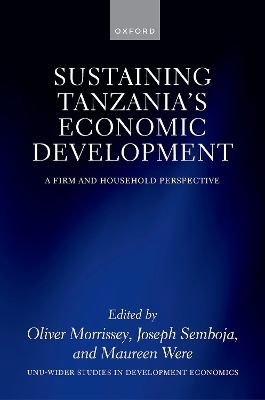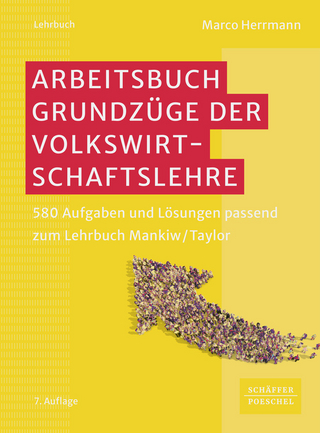
Sustaining Tanzania's Economic Development
Oxford University Press (Verlag)
9780192885746 (ISBN)
This is an open access title available under the terms of a CC BY-NC-SA 3.0 IGO licence. It is free to read at Oxford Academic and is offered as a free PDF download from OUP and selected open access locations.
This book investigates the performance of firms and households in Tanzania and the strategies they adopt to navigate shocks, achieve sustainability, and build resilience in order to sustain their growth and development. The contributions take into account competitiveness and productivity for firms, and income or welfare for households. Has the ability to navigate successfully through shocks and a changing economic environment improved over the past two decades? What are the lessons for managing and recovering from shocks, such as the COVID-19 pandemic?
Chapters cover a range of issues including competitiveness and value chains as determinants of (export) trade performance and the importance of technology, innovation, linkages, and value chains for the resilience and sustainability of firms. Trends in household income diversification and rural livelihoods, and improvements in financial inclusion, particularly through digital financial innovations such as mobile money services, promote the resilience and sustainability of households. Gender and regional, especially urban-rural, differences are incorporated.
Cross-cutting themes emerge: the need for modern technology and infrastructure to increase the productivity and employment of firms; the role of investment in human capital in reducing gender inequalities and equipping workers and entrepreneurs with relevant skills; and the importance of access to resources for innovation. The performance of Tanzanian firms has gradually improved since 2000 - although many challenges remain - and this has benefitted households through employment opportunities; the COVID-19 pandemic was however a significant shock to the economy and progress stalled or reversed as a result. Tanzania, like many countries, faces a challenging future but is better positioned to do so than it has been.
Oliver Morrissey is Professor in Development Economics and Director of CREDIT, School of Economics, University of Nottingham, and a Managing Co-Editor of the Journal of Development Studies. His primary research interests lie in aid policy (fiscal effects and conditionality), trade policy reform (including impacts on households), taxation, agricultural production, and labour markets, all with a focus on sub-Saharan Africa. He has published numerous articles in international journals, co-edited eight books and contributed to over 50 edited volumes. Joseph Semboja is the founding Chief Executive of UONGOZI Institute, also known as the Institute of African Leadership for Sustainable Development, an unprecedented organization in Tanzania concerned with executive education, policy dialogue, and research. He is known for his in-depth knowledge of socioeconomic development within Tanzania, as well as aspects of leadership, particularly within the public service. His career has spanned socio-economic research, senior management, and advising on the development, implementation, and analysis of major strategic policy and reform in Tanzania, where he has published several articles and books. Maureen Were is a Senior Economist in the Research Department at the Central Bank of Kenya. She spearheaded the work in this book while working as a UNU-WIDER researcher responsible for the collaborative research with the UONGOZI Institute in Tanzania, 2018-2021. She has a wealth of experience in economic policy, research, macroeconomic modelling, and teaching, and her main research interests include macroeconomics, financial inclusion, trade, and gender perspectives on development. She has authored several articles in refereed journals, working papers, and book chapters.
1: Oliver Morrissey, Joseph Semboja, and Maureen Were: Firms and households in Tanzania's development
2: Josaphat Kweka and Fadhili Sooi: Linkages with large firms and growth of SMEs in Tanzania
3: Julian Boys and Antonio Andreoni: Upgrading and multi-scalar industrial policy in the Tanzanian textile and apparel sector value chain
4: Amrita Saha, André Castro, Marco Carreras, and Daniele Guariso: Trade, technology, and local linkages in the Tanzanian textiles and garments sector
5: Roseline Misati and Kethi Ngoka: Drivers of manufacturing export performance and competitiveness in Tanzania
6: Laura Barasa: Addressing gender and innovation gaps
7: Rumman Khan and Oliver Morrissey: Labour diversification by households 2008-2013
8: Ralitza Dimova, Sandra Kristine Halvorsen, Milla Nyyssölä, and Kunal Sen: Long-run rural livelihood diversification in Kagera
9: Maureen Were, Maureen Odongo, and Caroline Israel: Gender disparities in financial inclusion in Tanzania
10: Oliver Morrissey, Joseph Semboja, and Maureen Were: Implications for making the achievements sustainable
| Erscheinungsdatum | 07.03.2024 |
|---|---|
| Reihe/Serie | WIDER Studies in Development Economics |
| Verlagsort | Oxford |
| Sprache | englisch |
| Maße | 164 x 240 mm |
| Gewicht | 510 g |
| Themenwelt | Wirtschaft ► Volkswirtschaftslehre ► Makroökonomie |
| ISBN-13 | 9780192885746 / 9780192885746 |
| Zustand | Neuware |
| Informationen gemäß Produktsicherheitsverordnung (GPSR) | |
| Haben Sie eine Frage zum Produkt? |
aus dem Bereich


